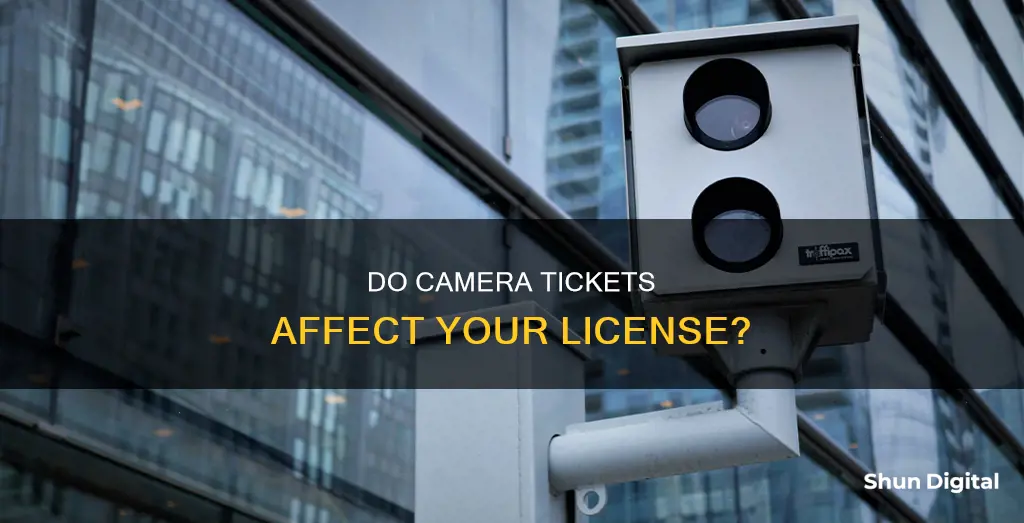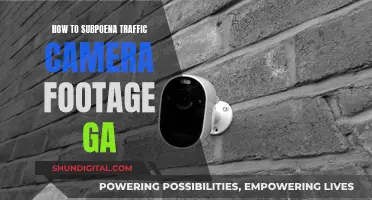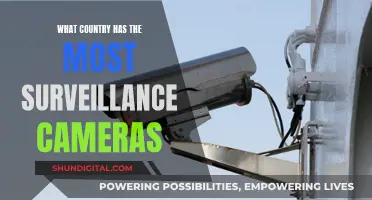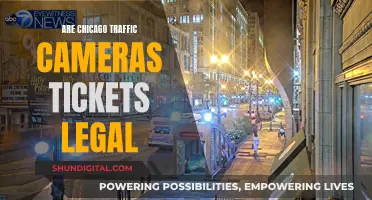
Whether or not camera tickets go on your driving record depends on where you live. In most states, camera tickets are treated like non-moving violations, similar to parking tickets, and do not go on your driving record. However, a few states, including Oregon, Arizona, and California, treat photo tickets like moving violations, which do go on your record and can result in points being added to your driver's license. Failing to pay a camera ticket can have consequences, such as increased fines, a negative impact on your driving record, and even a court summons. It is generally recommended to pay camera tickets or dispute them in court if you believe they were issued incorrectly.
| Characteristics | Values |
|---|---|
| Are camera tickets enforceable? | Yes |
| Are camera tickets civil violations? | Yes |
| Do camera tickets go on your driving record? | No, unless you are found guilty |
| Do camera tickets result in points on your license? | In most states, no. However, in Arizona, California, and Oregon, camera tickets are treated as moving violations, which can result in points on your license. |
| Do camera tickets affect insurance rates? | In most states, no. However, in Arizona, California, and Oregon, camera tickets can lead to increased insurance rates. |
| What happens if you don't pay a camera ticket? | Your car may be booted or towed. In some states, failure to pay can result in license suspension and higher fines. |
What You'll Learn

Camera tickets are treated as non-moving violations in most states
Camera tickets are often treated as non-moving violations in most states. Non-moving violations occur when a vehicle, whether in motion or not, breaks the traffic code. These violations are usually related to parking negligence or defective equipment. For example, parking in front of a fire hydrant or having a broken taillight are non-moving violations.
Non-moving violations are generally less serious than moving violations. They usually result in smaller fines and do not cause points to be added to your record. However, in some states, you will not be able to renew your license if you have several unpaid tickets. Non-moving violations also typically do not result in points being added to your driving record, but they can still result in a fine.
Moving violations, on the other hand, are infractions committed by a driver while a vehicle is in motion. These include things like speeding, running a red light, or driving under the influence of alcohol. Moving violations are often seen as more serious offenses and can result in points being added to your driving record, which can increase your insurance rates. They can also lead to fines, suspension of your driver's license, or even jail time.
While camera tickets are usually treated as non-moving violations, there are a few states that treat them as moving violations. Only three states consider red light camera tickets to be moving violations: Oregon, Arizona, and California. In these states, a red light camera ticket will result in points being added to your license and an increase in your insurance rates.
Understanding Camera Raw CS4: A Beginner's Guide
You may want to see also

Red light camera tickets can go on your driving record
Red light camera tickets can be a worrying surprise when they arrive in the mail. Not only do you have to pay a fine, but you may also wonder if your driving record and insurance rates will be affected.
The good news is that in most states, red light camera tickets are treated like non-moving violations, similar to parking tickets or tickets for an expired registration. This means they won't go on your driving record and your insurance rates won't be impacted. However, there are a few exceptions to this.
In some states, such as California, Oregon, and Arizona, red light camera tickets are considered moving violations. This means they can be added to your driving record and may result in points being added to your driver's license. For example, in California, a red light camera ticket will result in one point being added to your record, leading to higher insurance rates for three years.
It's important to note that even in states where red light camera tickets are considered moving violations, the impact on your driving record and insurance rates may depend on whether you are a habitual offender. If you are caught by a red light camera repeatedly, your driving record may reflect these offenses and your insurance rates may increase.
If you receive a red light camera ticket, it's always a good idea to review the specific laws and regulations in your state to understand how it may impact your driving record and insurance rates. In some cases, you may also have the option to fight the ticket or citation, especially if there are mitigating circumstances or issues with the evidence.
Understanding Stereo Mode in Camera: Enhancing Your Photography
You may want to see also

Camera tickets are harder to fight than tickets from police officers
In most states, camera tickets are treated as non-moving violations, similar to parking tickets or tickets for an expired registration. They usually don't result in points being added to your driver's license or an increase in your insurance rates. However, camera tickets can still be a hassle to deal with and may result in a fine.
Fighting a camera ticket can be more challenging than contesting a ticket from a police officer. Here's why:
Evidence:
When you receive a camera ticket, you typically get a photo or video footage of the alleged violation. This evidence can be hard to refute, especially if it clearly shows your vehicle, license plate, and the fact that you broke the law. While there may be valid defences, such as the camera malfunctioning or extenuating circumstances, it can be challenging to prove these claims.
Lack of Negotiation:
When you receive a ticket from a police officer, you have the opportunity to explain your side of the story and negotiate a reduced fine or avoid points on your license. However, with camera tickets, there is often no room for negotiation. The system is automated, and the penalties are predetermined.
Time and Cost:
Fighting a camera ticket can also be more time-consuming and costly. In some jurisdictions, you may have to pay a fee just to contest the ticket, and the process of gathering evidence and building a defence can be time-consuming. On the other hand, paying the fine for a camera ticket is usually a straightforward process.
Technical Defences:
In some cases, technical defences may be available for camera tickets that are harder to employ when dealing with tickets from police officers. For example, you may be able to argue that the camera system was faulty or that the signage warning of the camera's presence was inadequate. However, these defences can be complex and may require expert assistance.
While camera tickets are generally harder to fight than tickets from police officers, it is not impossible. If you believe you have a valid defence or if the evidence is inconclusive, you may still have a chance of getting the ticket dismissed. However, it is essential to carefully review the photos or videos provided and consult the specific laws in your state regarding camera tickets.
Upgrading Your DJI Phantom 3: Camera Battery Replacement Guide
You may want to see also

Camera tickets are considered civil violations
Camera tickets, also known as red light camera tickets, are issued when a camera catches a driver running a red light. These cameras are automated enforcement systems that law enforcement uses to monitor intersections. When a vehicle enters an intersection after a red light, the camera is triggered and takes two photos: one of the vehicle's license plate and one of the driver's face. The registered owner of the vehicle will then receive a ticket in the mail, which includes the amount to be paid, a copy of the citation, and photographic evidence.
In most states, camera tickets are treated as non-moving violations, similar to parking tickets or tickets for expired registration. These types of violations do not go on a driving record and typically do not affect insurance rates. However, there are a few exceptions. In Arizona, California, and Oregon, red light camera tickets are considered moving violations, which can result in points being added to a driver's license and increases in insurance rates.
It is worth noting that the laws regarding red light cameras vary across different states. While some states allow these cameras and use them to enforce traffic laws, other states have banned their use. Additionally, the penalties for violating a red light camera ticket differ from state to state. For example, in Virginia, a red light camera violation is treated differently from a ticket issued by a police officer. The maximum penalty for a red light camera ticket in Virginia is $50, and it is not considered a moving violation, so it will not go on the driver's record or affect insurance rates.
While camera tickets are generally considered civil or administrative violations, it is important to be aware of the specific laws and regulations in your state. Understanding the potential consequences of a camera ticket can help drivers make informed decisions and take appropriate actions, such as paying the fine or challenging the violation.
Creating Custom Camera Raw Presets: A Step-by-Step Guide
You may want to see also

Camera tickets do not impact insurance rates
It's important to note that laws regarding camera tickets vary depending on the state. However, in most states, camera tickets are treated as non-moving violations, similar to parking tickets or tickets for expired registration. These types of violations typically do not affect insurance rates.
In fact, according to the Insurance Institute for Highway Safety (IIHS), "automated enforcement citations are generally civil or administrative violations that do not result in points and are not made part of the driver's record." This means that unless a camera ticket results in points on your license or is added to your driving record, it is unlikely to impact your insurance rates.
Currently, only three states—Arizona, California, and Oregon—treat red light camera tickets as moving violations, which can lead to increased insurance rates. In these states, a red light camera ticket can result in points on your license and higher insurance rates for a period of time, typically three years.
It's worth mentioning that while camera tickets themselves may not directly impact insurance rates in most states, multiple tickets or violations on your record could lead to higher insurance premiums over time. Additionally, some insurance companies may take camera tickets into account when determining rates, even if they are not officially recorded as moving violations.
To summarize, while camera tickets typically do not impact insurance rates directly, it is always a good idea to be mindful of traffic laws and regulations to maintain a clean driving record and avoid any potential increases in insurance costs.
Guide Mode: Your Camera's Helper
You may want to see also
Frequently asked questions
Camera tickets are usually considered civil violations, so they don't go on your driving record. However, there are exceptions to this. In the US, Arizona, California, and Oregon treat camera tickets as moving violations, which do go on your record.
Camera tickets usually don't affect your insurance rates because they are not put on your driving record. However, if your state treats camera tickets as moving violations, your insurance rates may go up.
Yes, camera tickets are enforceable and should be paid. If you don't pay, the fine may increase, and you may receive a court summons.
If you ignore a camera ticket, the fine will increase, and your driving record may be negatively affected. You may also receive a court summons, which will cost additional fees in legal fees and time.







